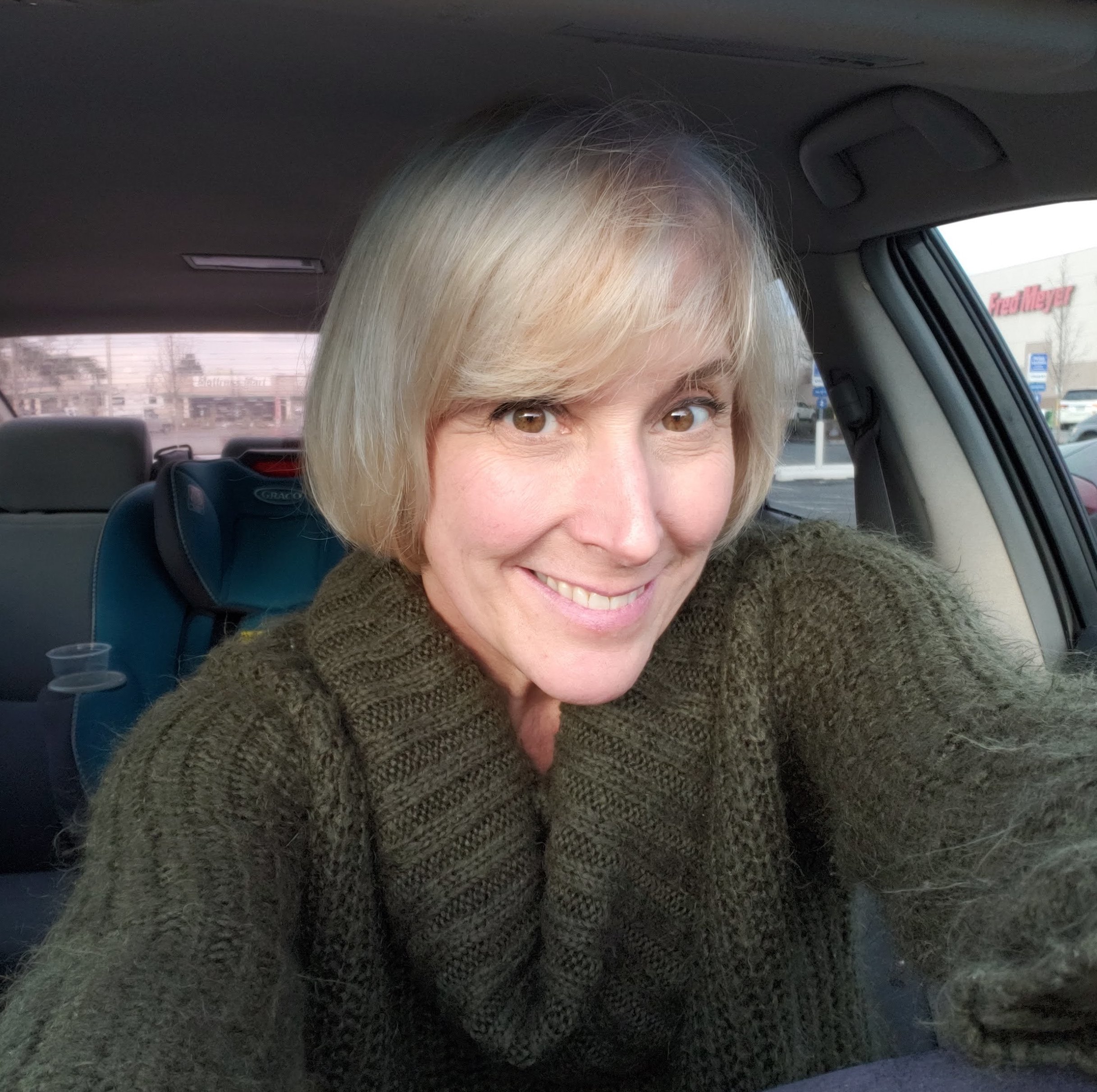
Amy Morris-Young (selfie)
Last week, I did something life-changing. That is, I changed something that has become my new normal for the rest of my life. I started the week looking to all the world like a brunette. By the end of the week, my husband Dan's new nickname for me was "Whitey," which has a nice old-school gangster ring to it.
Like many women in my family, my hair started going white in my late 20s. I henceforth helped support the hair color industry for nearly 30 years. But recently, when that skunk stripe would emerge on the top of my head every 10 days or so, instead of being horrified and rushing to cover it up, I found myself leaning in toward the mirror and thinking it was sort of pretty. It reminded me of my mom's mom, my Grandma Molly, who had the loveliest snow white hair. I am a grandmother now, so it just began to feel right.
The day before I started the transformation to my natural color, our nearly 4-year-old granddaughter, Mary, was here for daycare. I thought I had better warn her, so the change didn't surprise or scare her. So, after we sat down for lunch, I explained that the next time she saw me, my hair wouldn't be brown anymore, it would be white.
She grinned and yelled, "Like Elsa?!"
It hadn't occurred to me that the heroine of one of her favorite movies, Disney's "Frozen," had white hair. I smiled, "Yes. Just like Elsa."
She nodded then asked for more black olives to put on her fingertips.
After the transformation, I posted a photo on both Facebook and Instagram so my friends and family would be equally forewarned. If you happen to run into this white-haired lady who looks vaguely familiar, it's me.
What has been surprising is how many people sent me messages not only liking the new look, but saying that I was very "brave" and an "inspiration."
While I appreciate that aging is a scary process for all of us — and my decision signifies my embracing that instead of running from it — I certainly don't think it qualifies me as either inspiring or brave.
This change was 100 percent voluntary. It didn't result from my hair falling out from cancer treatment and growing back without color. The ladies in my life who have experienced that painful process have both retained their femininity in spite of bald heads and altered bodies and reclaimed their health through gritty battles. That is brave. And inspiring.
Advertisement
I didn't lose my hair because of baldness from skin conditions like alopecia. I don't have to face the world every day without hair or eyebrows or eyelashes, what our culture says makes us attractive. The girls and women who somehow find their own unique beauty and celebrate it, just the way they are, that is brave. And inspiring.
And no one threw acid on me, causing baldness, blindness and scarring because I am a female subjugated by a male-dominated culture. The hundreds of women who are victims of acid attacks each year live not only in developing countries, but in any place that their poverty or religious status make them second class citizens. Their perseverance in reclaiming their lives after horrific injuries and refusal to remain invisible, that is brave. And inspiring.
I am slowly getting used to the drastic change in my appearance. A couple times a day, when I pass a mirror or see my reflection in a window, I find myself doing a double take: Oh, yes, that white-haired lady is me!
We are none of us immune to visual first impressions, and yes, I do look older now. But I smile at that lady looking back at me. Like the women who came before her, she is a mother and grandmother, a survivor of all the mutations that being a woman entails. From adolescence through pubescence, from maternity through menopause, our bodies continually morph as we create and nurture life around and within us.
It is not always easy to see how my body is aging — my turkey-wattle neck and crinkly-lined forehead, for example — but I am happy to see my white-haired Grandma Molly smiling from the mirror, the squints of my Nonna Edith's eyes, the laugh lines of my mom. I am proud of them and of all us ladies.
It is all of you who are brave. And inspiring. You are glorious, just the way you are.
[Amy Morris-Young graduated from and taught writing at Loyola Marymount University in Los Angeles.]





